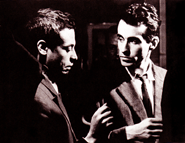Michel is an inscrutable young man – neatly dressed, mild mannered, intelligent – hardly the type whom one would suspect to be a pickpocket. And perhaps, that is reason that he does it. Robert Bresson’s Pickpocket is a well crafted, austere, and taut film of a man driven by his self-destructive compulsion. We first encounter Michel (Martin LaSalle) at a Paris racetrack, stealthily fingering through the clasp of a woman’s handbag, reaching in, pocketing her money. A wild, almost euphoric gaze comes over his impassive face, heightened by the cheering crowd as the horses approach the finish line. Soon, his compulsion consumes him. His friend, Jacques (Pierre Leymarie) furnishes him with contacts for employment opportunities, but he does not follow through. He abandons his studies, preferring to devote his time perfecting sleight of hand techniques: using a newspaper to disguise his actions, grabbing a victim’s wrist, bumping into taxi riders. But he is not as invisible as he thinks, catching the attention, not only of the police inspector (Jean Pelegri), but also a professional thief (Kassagi), who recruits him into his crime syndicate. In a mesmerizing, precisely choreographed train station scene, the band of thieves weave though the ticket counter line and a boarding train: distracting passengers, stealing, passing between accomplices, returning empty wallets to their owners. When his mother’s neighbor, Jeanne (Marika Green), is brought into the police station for questioning, Michel, warned by an already suspicious Jacques, flees to London to avoid arrest. Two years later, Michel returns to Paris, to an abandoned Jeanne, and inevitably, to his life of crime.
Similar to A Man Escaped, Bresson uses the recurring imagery of hands in Pickpocket: exercising his fingers for dexterity, practicing scenarios for deception, executing the theft. However, in contrast to Fontaine’s hands which serve as an instrument of his intellect, Michel’s hands represent a moral fracture within his soul. In essence, his compulsion is a subconscious disconnection of his mind from his body, a separation between his ambitious, theoretical ideas, and his common, unremarkable existence. His attraction to a life of crime is a reflection of his psychological fear of failure – his inability to achieve his perceived potential – a suppressed realization that he is not the “extraordinary man” that he believes himself to be. In the end, we see a humbled Michel, enheartened by a long-awaited visit from Jeanne. As Jeanne kisses his hands, Michel is redeemed from his past transgressions, with a renewed faith and the love of a devoted woman.
© Acquarello 2000. All rights reserved.
